
FEATURE PHOTO: … Even Bishops Believe


SPIRITUAL ENRICHMENT
GLUCKSTADT – St. Joseph, Fatima Five First Saturdays Devotion, Jan. 3, Feb. 7, March 7, April 4 and May 2. Church opens at 8 a.m.; Mass at 9 a.m.; followed by Rosary. Details: church office (601) 856-2054.
DIOCESE – Engaged Encounter 2026 dates, Feb. 27-March 1; April 24-26; Aug. 28-30; Oct. 2 -4. Details: couples may register at https://jacksondiocese.flocknote.com/signup/230073 or email debbie.tubertini@jacksondiocese.org.
Dr. Martin Luther King, Jr. Celebration, Saturday, Jan. 17 at 1 p.m. at the Cathedral of St. Peter, Jackson. Theme is “Beholding the Dream” with speaker Dr. William Jemison.
World Marriage Day 2026, Join us Saturday, Feb. 7 at the Cathedral of St. Peter in Jackson at 1 p.m. or Saturday, Feb. 14 at St. James Tupelo at 1 p.m. for this celebration of marriage across the diocese. If you are celebrating your 25th, 30th, 40th, 50th, 60th+ in 2026 this celebration is for you! Please register to join us by visiting jacksondiocese.org/family-ministry. Details: email debbie.tubertini@jacksondiocese.org.
JACKSON – St. Richard, Ladies Retreat, Feb. 6-8, 2026 at Our Lady of Hope Retreat Center in Osyka. Open to women age 21+. Cost: $300/person, includes accommodations and all meals. Deadline to register is Jan. 16. Details: email claudiaaddison@mac.com.
OXFORD – Diocesan Campus Ministry Winter Retreat “Radical Grace: Living the Gospel Upside Down,” Saturday, Jan. 31, 2026 from 10 a.m. to 5 p.m. at St. John the Evangelist Church. Cost: $20 – Registration deadine is Jan. 23. Come and be renewed! Details: amelia.rizor@jacksondiocese.org.
PILGRIMAGE – Travel to Italy with Father Jose de Jesus Sanchez of St. Joseph Greenville, Feb. 16-25, 2026. See the Vatican, Assisi and more. Details: visit catholicjourneys.com/tour/shrines-of-italy-pilgrimage.
PARISH & YOUTH EVENTS
GREENWOOD – St. Francis, Mardi Gras Ball, Saturday, Feb. 14 from 7-11 p.m. at the Andrew McQueen Civic Center. Cost: $45/person. Details: (662) 453-0623.
JACKSON – Knights of Peter Claver Ladies Auxiliary Court #199, Annual Mardi Gras Ball, Feb. 7 at Fondren Hall from 7-11 p.m. Cost: $40/person. Attire: “after five.” Details: Christ the King church office (601) 948-8867.
JACKSON – St. Richard, Krewe de Cardinal Mardi Gras Ball, Saturday, Feb. 7 at the Westin Jackson. Details: visit https://bit.ly/4pGfEAc for more info.
MADISON – St. Joseph School, Annual Draw Down, Saturday, Jan. 24, 2026, at Reunion Country Club. Details: school office (601) 898-4800.
MERIDIAN – Knights of Columbus Mash Bash Blood Drive, Tuesday, Dec. 30 from 9:30 a.m. to 6:30 p.m. in the K of C Hall. Details: schedule through vitalant.org.
PARISHES OF NORTHWEST MS – World Youth Day in South Korea, Aug. 3-7, 2027. Join the Priests of the Sacred Heart on an unforgettable pilgrimage that includes Mass with Pope Leo and more. For ages 16-23. Cost: $1,333 plus fundraising. Application packets available in the parish office. Details: Contact Vickie at (662) 895-5007.
By Galen Holley
NEW ALBANY – Luis, de siete años, tenía el aspecto perfecto, con su bigote dibujado y su tilma holgada, y al verlo junto a sus padres, uno podía imaginar a Juan Diego devorando una galleta antes de la misa, tal como lo hacía Luis. La gloria y la pompa de la fiesta de Nuestra Señora de Guadalupe resplandecían en una fría noche en New Albany.
“Sentimos que nuestros corazones arden de gratitud hacia Nuestra Señora”, dijo Alma Solís, quien, el 12 de diciembre, se afanaba en el santuario organizando la celebración. Solís, una voluntaria incansable, dirigía a los monaguillos, daba indicaciones a los bailarines y traducía sobre la marcha del inglés al español.
“La celebración es importante para los católicos y especialmente para los mexicanos”, dijo Solís, cuyo suegro, Pablo García, a pesar de la barrera del idioma, se está formando para convertirse en diácono.
Los padres de la comunidad hispana habían vestido a sus hijos pequeños como el santo campesino Juan Diego, el sencillo indígena a quien, en 1531, se le apareció María, la Madre de Dios. Nuestra Señora visitó a Juan Diego en el cerro del Tepeyac, en lo que hoy es la Ciudad de México. Amonestó al pueblo para que abandonara las prácticas paganas y ofreció señales milagrosas como prueba del amor de Jesús. María, por el poder de Dios, hizo florecer rosas en invierno en el cerro del Tepeyac, y desde entonces el catolicismo floreció en América Latina.
Los católicos construyeron una iglesia en el lugar de la aparición en el siglo XVI, y hoy en día es uno de los destinos más visitados de todo el mundo cristiano. Sin embargo, como dijo el párroco de San Francisco, el padre Xavier Jesuraj, en su homilía del 12 de diciembre, la basílica representa algo más profundo.

“La construcción de la iglesia no era lo más importante para la Santísima Madre”, dijo el padre Raj.
“La Virgen estaba presente no solo como un signo externo, sino como una promesa de que ella está con nosotros en nuestras alegrías y tristezas, en todos los momentos y aspectos de nuestras vidas. Ella nos anima a ofrecer nuestras vidas cotidianas como una devoción y una continuación de la celebración en la que participamos esta noche”.
La imagen de Nuestra Señora de Guadalupe se ha convertido en el símbolo de fe más popular entre los católicos mexicanos. La aparición inculturada de María, con piel morena y cabello oscuro, contrasta fuertemente con las imágenes europeas de la Santísima Madre y sugiere su carácter universal como Madre de la Iglesia. Como dijo el padre Raj: “Ella vino como una señal no solo para América Latina, sino también para Europa y todo el mundo, proclamando el amor de su hijo, Jesús”.
Los bigotes dibujados en los labios de los bebés en San Francisco eran una adorable señal de lo mucho que significa la fiesta de Nuestra Señora de Guadalupe para los católicos hispanos. La visión de los beatificados liliputienses tambaleándose en el santuario, vestidos con sus trajes campesinos y con sombreros de paja en la mano, era suficiente para inspirar deleite religioso.
La parroquia de San Francisco celebró recientemente su septuagésimo quinto aniversario y, como cada 12 de diciembre, la iglesia estaba abarrotada. La pequeña Kaitlyn Melany colocó con cariño, aunque tímidamente, un ramo de flores ante la estatua de Nuestra Señora. Ulysses Sánchez, de un año, dormía angelicalmente en brazos de su madre, vestido con su traje de Juan Diego, de color rojo y verde. Katherine y su hermana pequeña, Melanie, iban vestidas como Nuestra Señora y parecían disfrutar del espectáculo y la energía de la congregación.
Afuera, los miembros del grupo de baile de la iglesia católica St. Matthew en Ripley, entre ellos Emily Juárez, Sandy Ruiz Martinze y Giovanni Martínez, se movían al ritmo de los golpes del tambor. Los fieles cantaban himnos a Nuestra Señora, dando gracias por su intercesión y sus oraciones, y luego disfrutaban de una suntuosa comida mientras los niños correteaban con sonrisas y gritos de alegría.
(Galen Holley es miembro de la parroquia de San Francisco de Asís en New Albany. Puedes contactarlo en galenholley@gmail.com y ver su “Podcast de San Miguel” en YouTube).
Por Joanna Puddister King and Tereza Ma
JACKSON – La comunidad carmelita de la Diócesis de Jackson celebró la profesión solemne de los votos religiosos de la hermana Maryann Wambui Koine de Jesús Crucificado, OCD, durante una misa celebrada el sábado 6 de diciembre en la capilla del monasterio carmelita.
El obispo Joseph R. Kopacz ofició como celebrante principal mientras la hermana Maryann pronunciaba sus votos solemnes de pobreza, castidad y obediencia ante las monjas carmelitas descalzas, los miembros de los Carmelitas Seglares y amigos de la comunidad de Jackson y alrededores.
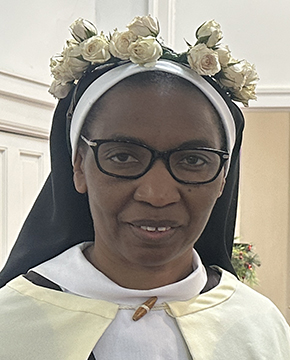
En su homilía, el obispo Kopacz reflexionó sobre el Monte Carmelo y la tradición carmelita, haciendo hincapié en que la profesión religiosa no solo apunta a una vocación particular, sino al llamado bautismal compartido por todos los cristianos. Arraigada en el misterio de la Cruz, dijo, la vida religiosa da testimonio de la esperanza de la vida eterna y llama a la Iglesia a una fidelidad más profunda a Cristo.
Religious life, the bishop noted, “points toward heaven,” reminding the faithful that following Christ requires daily self-gift and transformation of heart and mind – a call lived uniquely through the vows of religious life and universally through baptism.
La hermana Maryann, originaria de Kenia, ingresó por primera vez en el Carmelo de Savannah, Georgia, en 2015. Hizo sus primeros votos en 2018 y se trasladó al monasterio carmelita de Jackson en 2024, tras el cierre de la comunidad de Savannah. Su profesión solemne marca un compromiso de por vida con el estilo carmelita de oración contemplativa y sencillez.
Tras la misa, la hermana Maryann expresó su gratitud a quienes la habían apoyado en su vocación, dando las gracias a los sacerdotes, hermanas y miembros de la comunidad que la habían acompañado a lo largo de su camino. “Esta comunidad ha sido mi segunda familia”, afirmó. “Estoy agradecida por formar parte de ella”.
También agradeció la presencia de su madre, que viajó desde Kenia para asistir a la profesión y pasó varias semanas visitando a su hija en el monasterio. Aunque las barreras lingüísticas limitaron la comunicación durante la liturgia, la hermana Maryann dijo que la alegría compartida en la ocasión trascendió las palabras.
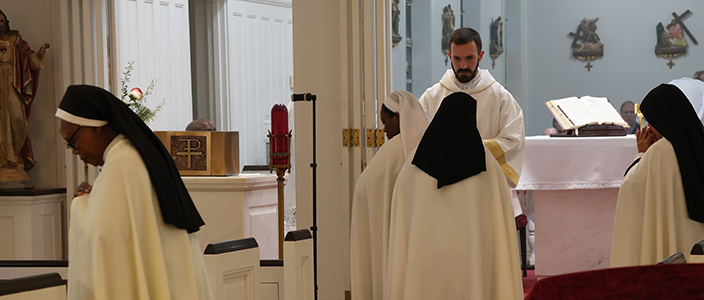
Por Obispo Joseph R. Kopacz, D.D.
“Todos los confines de la tierra verán la salvación de nuestro Dios.” (Isaías 52:10)
Durante casi dos mil años, la Buena Nueva del nacimiento, vida, muerte y resurrección de nuestro señor Jesucristo ha sido proclamada a todas las naciones. Ahora más que nunca, a través de los canales modernos de comunicación, el mensaje llega hasta los confines del mundo para que la gente escuche esta Buena Nueva y vea a la iglesia en su entorno sirviendo a su Señor de múltiples maneras.
Los siguientes tres extractos han sido seleccionados de diferentes épocas de la historia de la iglesia para afirmar que, aunque el mundo se encuentre en constante cambio, Jesucristo es el mismo ayer, hoy y mañana.

Lo siguiente se extrae de las profundas obras de aquel que fue considerado “boca de oro” por su brillante predicación:
“Que la naturaleza invisible y eterna no ha despreciado por nosotros tomar para sí las debilidades de nuestra carne. El Hijo de Dios, que es el Dios de todas las cosas, nace hombre en cuerpo. Se permite ser colocado en una cuna, que sostiene el cielo en sus manos. Está confinado en un pesebre que el mundo no puede contener; se le oye en la voz de un bebé llorando, ante cuya voz en la hora de su pasión tembló toda la tierra.” – San Juan Crisóstomo, Homilía de la Epifanía
Este santo del siglo IV fue exiliado tres veces y sufrió enormemente en manos de los herejes arrianos de su época. No solo perseveró; prosperó como testigo viviente del poder de la Palabra hecha carne.
En el siglo V, el papa León el Grande, que resistió a Atila el Huno en las puertas de Roma, convenciéndole de no saquear la ciudad, fue uno de los padres más elocuentes de la iglesia primitiva. Lo siguiente proviene de una homilía navideña suya y adorna la oración navideña contemporánea de la Iglesia Católica en la Liturgia de las Horas:
“Hoy nace nuestro Salvador; Regocijémonos. La tristeza no tiene lugar en el cumpleaños de la vida. El miedo a la muerte se abrasa; La vida nos trae alegría con la promesa de la eternidad. Nadie se queda excluido de esta alegría. Que los justos se regocijen, porque su recompensa está cerca. Que los pecadores se alegren, porque se les ofrece misericordia. Que los paganos tomen valor, porque son llamados a la vida. … En este misterio del Verbo hecho carne, se otorga una nueva dignidad a la naturaleza humana. Oh cristiano, reconoce tu dignidad. Haz un compañero en la naturaleza divina. No vuelvas por pecado a tu antigua maldad. Recuerda quién es tu cabeza y de quién eres miembro, y por cuya sangre fue comprada tu libertad.” – Papa San León Magno
En nuestro tiempo, luchamos por permitir que la luz eterna del Verbo hecho carne brille en la oscuridad y las sombras de nuestro mundo caído. Lo siguiente está extraído de la serie “Palabra de Vida” de los Focolares de diciembre de 2025, cuya misión es la unidad y cuyo camino es el amor:
“A un mundo como el nuestro, donde prevalece la ley del más fuerte, del más inteligente, de lo más inescrupuloso, y donde a veces todo parece paralizado por el materialismo y el egoísmo, recibimos la inocencia desarmada del Niño Jesús, y reconocemos una vez más la presencia paciente y misericordiosa de Dios en la historia humana.”
Al celebrar la culminación del Año Jubilar de la Esperanza esta Navidad en la Epifanía, proclamamos que el amor de Dios ha sido derramado en nuestros corazones por medio del Espíritu Santo que nos ha sido dado, porque el amor de Dios fue derramado por primera vez en nuestro mundo en aquella primera noche de Navidad, hace casi 2,000 años.
Que los Sabios de nuestro tiempo sigan buscando aquel que es el camino, la verdad y la vida, que revela que el sacrificio y amo por todos es el único camino para cumplir nuestros sueños.
CASTEL GANDOLFO (CNS) – Al final de su único día libre a la semana, el papa León XIV acudió a la escuela local de Castel Gandolfo y se unió a cientos de padres emocionados para ver el concierto de Navidad de los niños.
Tras 45 minutos de canciones en italiano, latín, inglés y español, el papa León agradeció a los niños y a sus maestros “la invitación que llegó misteriosamente a mi casa, pero quizá aún más misteriosa fue la respuesta cuando se enteraron de que había decidido venir”.
Poco después de que el papa llegara el 16 de diciembre y el personal de la escuela convenciera a los padres para que se sentaran, más de 200 alumnos, desde los mayores hasta los más pequeños, subieron al escenario del gimnasio vestidos con sudaderas blancas y pantalones oscuros.
Todos los niños comienzan a estudiar inglés en la escuela primaria, y la primera pieza que cantaron en inglés fue un emocionante “Joy to the World”. También cantaron “The Little Drummer Boy” acompañándose con movimientos de manos a modo de tambores.

Al final del concierto, antes de guiar a los niños en el Padrenuestro – que una clase también recitó en lengua de señas italiana –, el papa Leo habló sobre la primera canción, un villancico italiano moderno que narraba cómo los ángeles cantaban la noticia del nacimiento de Jesús.
“Las palabras más bonitas eran sobre los “ángeles que traen amor”, y vosotros sois los que nos habéis traído amor a todos esta noche”, dijo el papa a los niños.
San Agustín dijo una vez: “El que ama, canta”, les dijo.
“Esto es la Navidad: Dios que quiso acercarse a nosotros, especialmente a los más pequeños”, dijo el Papa, expresando su esperanza de que “podamos sentir y vivir este amor” durante todo el año.
El papa León también agradeció a los niños por cantar en varios idiomas, demostrando que la Navidad llena de alegría y paz los corazones de los creyentes de todo el mundo.
También citó una conocida canción italiana que dice: “En Navidad se puede hacer más”.
“Es una invitación para todos nosotros”, dijo el papa. “Hagamos más para proclamar la paz, el amor y la unidad en el mundo”.
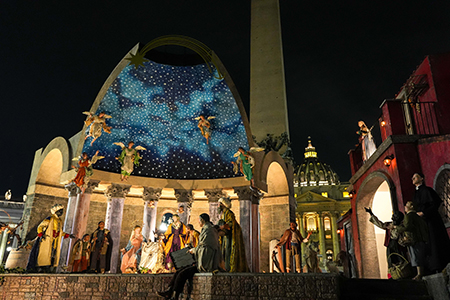
NACIÓN
BURLINGTON, Washington (OSV News) – Varias parroquias y escuelas del oeste de Washington han cerrado sus puertas debido a las históricas inundaciones que ha sufrido el estado. El gobernador Bob Ferguson anunció el 12 de diciembre que el presidente Donald Trump había firmado la solicitud del estado para declarar el estado de emergencia, lo que permite utilizar fondos federales como ayuda en 16 condados y varias naciones tribales afectadas por las inundaciones. El Movimiento Laudato Si’ del estado de Washington emitió un comunicado el 11 de diciembre en el que decía: “Estamos trabajando junto con la Arquidiócesis de Seattle, los Servicios Comunitarios Católicos y otras agencias colaboradoras para prepararnos y proporcionar ayuda de emergencia, según sea necesario”. Entre los cierres se encuentran la parroquia de San Carlos en Burlington, la misión de Santa Catalina en Concrete, la parroquia de Nuestra Señora de los Dolores en Snoqualmie, la escuela de San José en Issaquah y la escuela de la Inmaculada Concepción en Mount Vernon. También se ha cerrado el banco de alimentos Tri-Parish Food Bank de San Carlos. En su comunicado, el Movimiento Laudato Si’ del estado de Washington afirmó que “mantiene a todos los afectados en sus oraciones” y calificó la devastación de “desgarradora”. A primera hora del 15 de diciembre, el Servicio Meteorológico Nacional afirmó que “un periodo de clima muy activo dominará la semana que viene, ya que una serie de fuertes sistemas frontales producirán impactos en cascada en todo el oeste de Washington”.
WASHINGTON (OSV News) – La Oficina de Misiones Afroamericanas e Indígenas, con sede en Washington, está recibiendo un impulso gracias a dos nuevos documentales de media hora de duración: “Pioneros de la fe: el legado de los católicos afroamericanos” y “Recorriendo el camino sagrado: la historia de la Oficina de Misiones Afroamericanas e Indígenas”. El padre Maurice Henry Sands, sacerdote de la arquidiócesis de Detroit que dirige la oficina, espera que sirvan de ayuda para recaudar fondos. Los tráilers de las películas se pueden ver en el sitio web de la oficina misionera, https://blackandindianmission.org/films. “Pioneros de la fe” cuenta la historia de cómo los afroamericanos han podido abrazar la fe católica sin abandonar su propia cultura. Se presta especial atención a las Hermanas Oblatas de la Providencia, con sede en Baltimore, la primera orden católica de Estados Unidos para mujeres negras, así como a la venerable madre Henriette Delille, de Nueva Orleans, la sierva de Dios Julia Greeley, el venerable padre Augustus Tolton y la sierva de Dios hermana Thea Bowman. Todos ellos forman parte de un grupo de siete católicos negros con causas de canonización en curso, conocidos como los “Siete Santos”. La Oficina de Misiones Negras e Indígenas se creó en 1874 como Oficina de Misiones Católicas, y en los años siguientes se le añadieron objetivos más amplios. La oficina se encuentra en una casa adosada de ladrillo que perteneció a Santa Katharine Drexel (1858-1955), la heredera de Filadelfia que dedicó su vida y su fortuna al servicio de los nativos americanos y los afroamericanos.
VATICANO
CIUDAD DEL VATICANO (CNS) – El belén y el árbol de Navidad son signos de fe y esperanza, dijo el papa León XIV. “Mientras los contemplamos en nuestros hogares, parroquias y plazas, pidamos al Señor que renueve en nosotros el don de la paz y la fraternidad”, dijo, pidiendo oraciones por todos aquellos que sufren a causa de la guerra y la violencia. “Debemos eliminar el odio de nuestros corazones”. El Papa habló el 15 de diciembre durante una reunión con los representantes del Gobierno, los artesanos y los donantes responsables de proporcionar los adornos navideños en la Sala de Audiencias Pablo VI y en la Plaza de San Pedro. El Papa León agradeció al artista costarricense que creó el belén para la sala de audiencias, titulado “Nacimiento Gaudium”. Creado por Paula Sáenz Soto, muestra a la Virgen María embarazada y 28 000 cintas de colores, cada una de las cuales representa una vida salvada del aborto gracias a las oraciones y el apoyo prestado a muchas madres en dificultades por organizaciones católicas, según un comunicado de prensa de la oficina de gobierno de la Ciudad del Vaticano. “Agradezco a la artista costarricense que, junto con el mensaje de paz en Navidad, también ha querido lanzar un llamamiento a la protección de la vida desde el momento de la concepción”, dijo el papa León. “El belén y el árbol de Navidad son signos de fe y esperanza”, dijo a todos los presentes. “Que la ternura del niño Jesús ilumine nuestras vidas. Que el amor de Dios, como las ramas de un árbol siempre verde, permanezca ferviente en nosotros”.
CIUDAD DEL VATICANO (CNS) – Incluso en situaciones difíciles y lugares hostiles, como las prisiones, cuando las personas se centran en cuidarse unas a otras, respetarse mutuamente y ofrecer perdón, “florecen hermosas flores del “terreno duro” del pecado y el sufrimiento”, dijo el papa León XIV. Vestido con vestimentas rosas para el Domingo Gaudete, tercer domingo de Adviento, el papa celebró la misa en la basílica de San Pedro el 15 de diciembre con motivo del Jubileo de los Presos. Participaron reclusos y exreclusos, tanto adultos como menores, de Italia, España, Portugal, Malta y Chile, acompañados por guardias y capellanes, así como representantes de otros 85 países. Fue el último de los grandes eventos del Jubileo antes de Navidad y del cierre del Año Santo el 6 de enero. Las hostias consagradas durante la misa fueron elaboradas por reclusos de las prisiones italianas de Opera, San Vittore y Bollate. Forman parte de un proyecto en el que participan más de 300 reclusos de prisiones de toda Italia que elaboran regularmente hostias para 15 000 iglesias y parroquias.
MUNDO
SÍDNEY (OSV News) – Después de que dos hombres armados atacaran a bañistas judíos en un evento que celebraba el primer día de Hanukkah en un atentado terrorista en la playa Bondi de Sídney, el papa León XIV destacó la cercanía de Dios a la humanidad y pidió oraciones por aquellos que sufren a causa de la guerra y la violencia, especialmente las víctimas de la comunidad judía en Australia. “¡Basta ya de estas formas de violencia antisemita!”, dijo el papa León el 15 de diciembre, dirigiéndose a los grupos que donaron el árbol de Navidad y el belén del Vaticano de este año. “Debemos eliminar el odio de nuestros corazones”, destacó. En una declaración del 15 de diciembre, el arzobispo Anthony Fisher de Sídney pidió el fin de la “atmósfera de antisemitismo” en Australia. También compartió que él personalmente tiene ascendencia judía por parte de su bisabuela y que, como cristianos, “un ataque contra los judíos es un ataque contra todos nosotros”. Apenas unas horas después del tiroteo y de un informe inicial de 12 muertos, el número de víctimas mortales ascendió a 15. The Guardian informó de que entre las víctimas se encontraban una niña de 10 años, un rabino y dos supervivientes del Holocausto. La policía confirmó que el segundo tirador estaba detenido y en estado crítico. Según las autoridades, más de 40 personas resultaron heridas y fueron trasladadas al Hospital St. Vincent. El ataque se produjo a primera hora de la tarde, cuando cientos de personas se habían reunido en Archer Park, una zona verde en Bondi Beach.
Vírgenes y Santos
San Juan, Apóstol y evangelista.
27 de diciembre
Sagrada familia de Jesús, María y José
28 de diciembre
Solemnidad de Santa María, modre de Dios.
1 de enero
Epifanía del Señor.
5 de enero
Bautismo del Señor.
12 de enero
Envíenos sus fotos a editor@jacksondiocese.org
Síganos en Facebook: @DiócesisCatólicadeJackson
Únase a lista de correos electrónicos
Mande un texto: MSCATHOLIC a 84576
LÍNEA DIRECTA DE PREVENCIÓN DE FRAUDE
El Departamento de Asuntos Temporales de la Diócesis de Jackson ha contratado a Lighthouse Services para proporcionar una línea directa anónima de fraude financiero, cumplimiento, ética y recursos humanos. Esta línea directa permite un método adecuado para reportar sucesos relacionados con la administración temporal dentro de parroquias, escuelas y la oficina de cancillería.
www.lighthouse-services.com/jacksondiocese
Hispanohablante USA: 800-216-1288
By Joanna Puddister King
MADISON – Parish leaders from across the Diocese of Jackson gathered at St. Francis of Assisi Church on Saturday, Nov. 15, for the annual Fall Faith Formation Day, a one-day workshop hosted each November by the Department of Faith Formation. This year’s theme, “Pilgrims of Hope: Journeying Together,” invited catechists, youth ministers, DREs and parish volunteers to reflect on their call to accompany the people of God with renewed purpose.
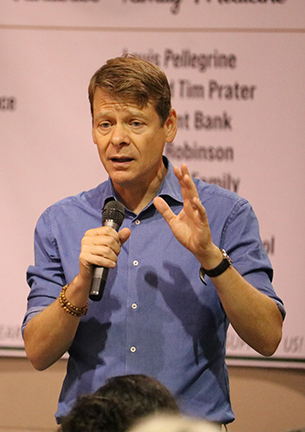
The keynote presenter was Robert Feduccia, a nationally recognized speaker who grew up in Brookhaven and attributes his own call to ministry to formative experiences in the Diocese of Jackson. He opened the day with lively “would you rather” questions that had participants laughing, moving and interacting with one another before leading them into deeper conversations about the heart of ministry.
Feduccia encouraged parish leaders to see themselves not as program directors who simply manage logistics, but as ministry leaders rooted in the church’s tradition and attentive to the lived reality of their parish communities. He noted that Mississippi’s Catholic population, though small and diverse, is uniquely positioned for authentic accompaniment and relationship-based ministry. He urged participants to present the faith as truly good news, helping people encounter Christ rather than focusing solely on intellectual debates or apologetics.
Sister Amelia Breton provided live translation during the keynote, allowing Spanish-speaking participants to engage fully. For the first time, the event also offered breakout sessions presented entirely in Spanish.
Throughout the day, attendees chose from a range of practical workshops addressing real needs in parish life. Presenters included Sister Amelia Breton, who spoke on accompaniment of migrant communities; Rebecca Harris, who discussed parish fundraising and stewardship; Emily Moran, who explored the confirmation journey with young people; Ruth Powers, who addressed reclaiming community life within parishes; Amelia Rizor, who focused on small-group ministry; and Debbie Tubertini, who offered insights on marriage enrichment. Spanish-language sessions were led by Danna Johnson and Raquel Thompson, who both presented on developing community involvement and small groups within parish settings.
In the closing session, Fran Lavelle, director of Faith Formation, introduced the work of the Bishop William R. Houck Center for Lay Formation. She emphasized that one of the most important lessons learned through the diocesan synod and pastoral reimagining process is the need to respond when the faithful are asked to share their needs and hopes. She said the Center represents a concrete response to that input and thanked those who helped develop its formation path.
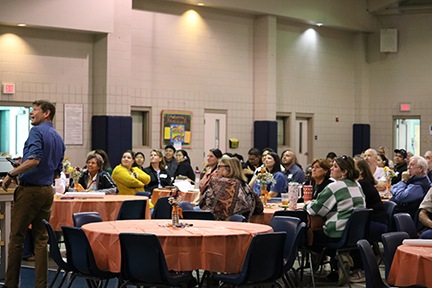
The Bishop Houck Center for Lay Formation is designed to help lay leaders grow in faith, knowledge and service through programs grounded in education, evangelization and leadership development. The initiative builds on Bishop Houck’s legacy of supporting lay ministry and evangelization and offers formation opportunities in both English and Spanish for parish teams and individual leaders across the diocese.
The event closed with a final keynote from Feduccia, sending participants back to their parishes encouraged, energized and reminded that God works powerfully through the faithful who say yes to serving his church.
(To learn more about the Bishop William R. Houck Center for Lay Formation and upcoming opportunities for training and enrichment, visit jacksondiocese.org/bishop-houck-center-for-lay-formation.)